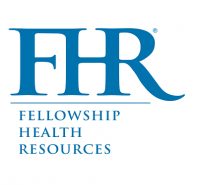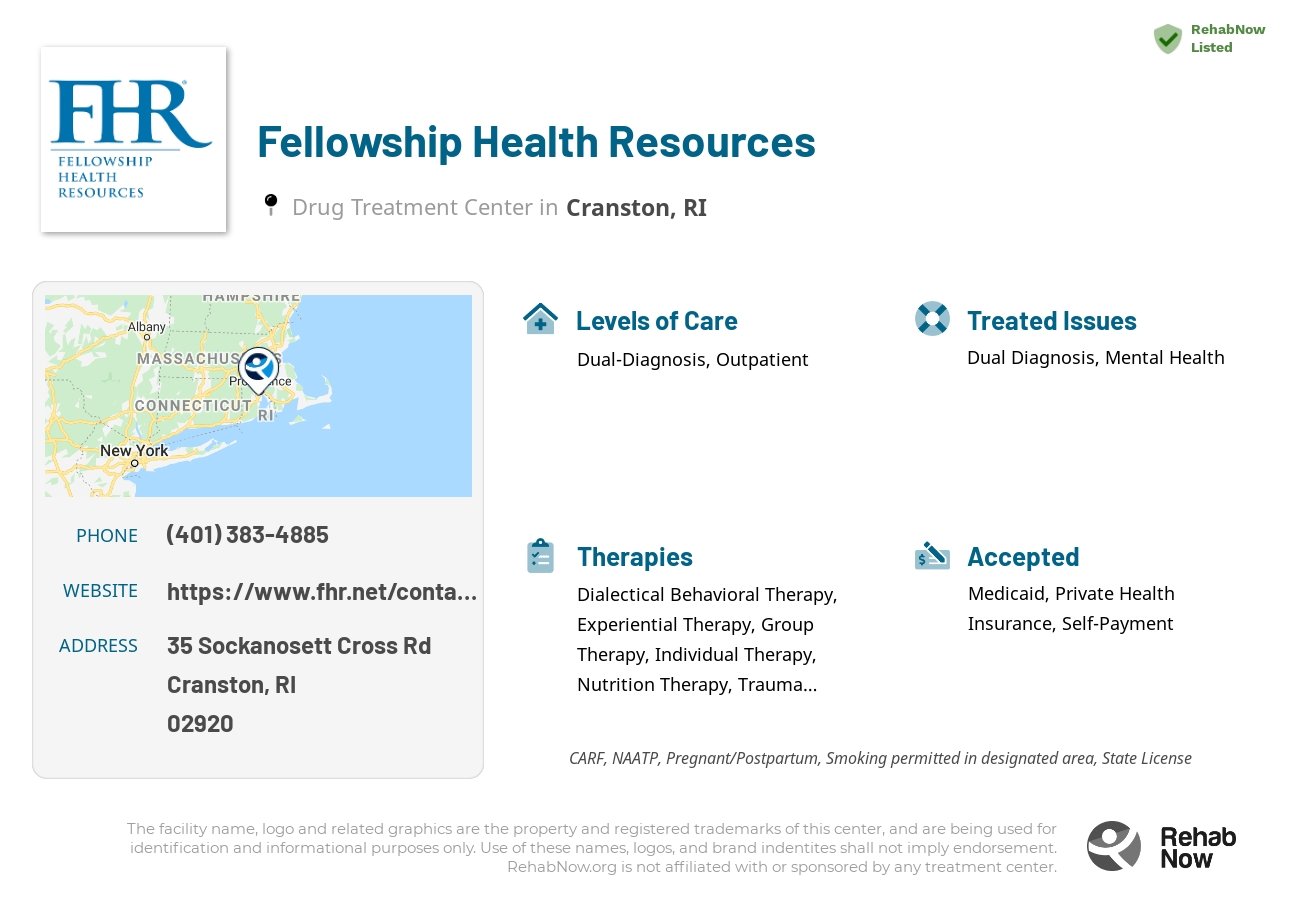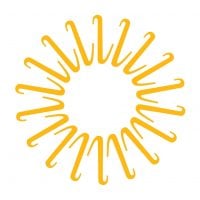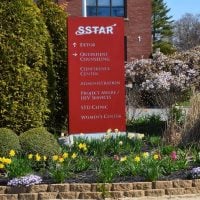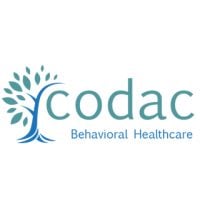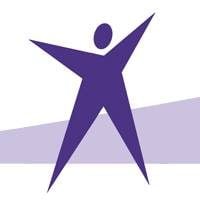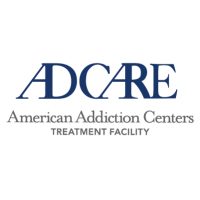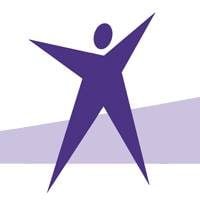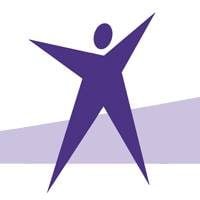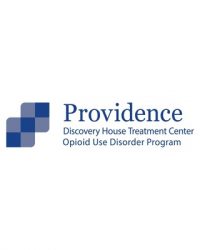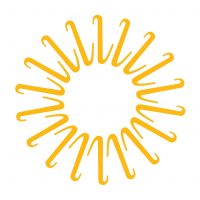Fellowship Health Resources
Drug Rehab Center in Cranston, Rhode Island
Fellowship Health Resources in Cranston, Rhode Island provides comprehensive addiction treatment services, including evidence-based and holistic treatments, to individuals with a dual-diagnosis of mental health and drug addiction, aiming to help them reach and maintain recovery through individualized care and various specialized programs.
About This Cranston, RI Facility
Fellowship Health Resources is a comprehensive addiction treatment facility located in Cranston, Rhode Island that has been providing compassionate and quality services since 1975. They focus on providing evidence-based, holistic treatments to individuals living with a dual-diagnosis of mental health and drug addiction. The facility offers a range of care levels, such as inpatient, outpatient, and dual-diagnosis programs, as well as a variety of specialized treatments to help individuals reach and maintain recovery. Fellowship Health Resources is accredited by The Joint Commission and licensed by the State of Rhode Island Department of Behavioral Healthcare.
Fellowship Health Resources offers quality, individualized care for individuals suffering from substance abuse and addiction. Their treatments involve a combination of evidence-based practices and holistic healing therapies, such as yoga, mindfulness, meditation, nutrition, and art therapy. Their approach to treatment is tailored to each individual, taking into consideration their unique needs, and focuses on helping them transition from addiction to sustained recovery. Fellowship Health Resources also accepts private health insurance and offers flexible payment plans to make treatment accessible to all.
Genders
Ages
Modality
Additional
Conditions and Issues Treated
Substance use disorder falls under two categories: Alcohol or Drug Abuse and Drug Dependence. An individual suffering from a substance use disorder and mental health disorders is said to have a co-occurring disorder or a dual disorder. Individuals in Cranston, RI with substance use disorders and mental health problems are said to suffer from a ‘dual diagnosis’.
The most frequently identified mental health issues found in individuals with substance use disorders include anxiety, depression, schizophrenia, and schizoaffective disorder.
Levels of Care Offered
This center offers a variety of custom treatment tailored to individual recovery. Currently available are Dual-Diagnosis, Outpatient, with additional therapies available as listed below.
Outpatient treatment is treatment that occurs when a patient is not checked into a rehab facility. The patient may show up for therapy sessions, go through detox and engage in other therapies to help them recover. However, they will do so while they live at home in Rhode Island.
Outpatient therapy provided by Fellowship Health Resources is usually recommended as a follow up to inpatient therapy. It helps patients adapt to their normal lives after treatment. In some cases, it can also be an alternative to inpatient treatment. People may choose this route if they are unable to leave their jobs, children or if they don’t have the money for inpatient treatment. However, inpatient treatment is the best way to recover from addiction.
Fellowship Health Resources‘s Therapies & Programs
Individual therapy aims to identify the core issues that would have led the patient to substance abuse and address the root cause effectively. Patients find the therapist as a person who they can trust. It helps them to open up and discuss personal and sensitive issues, which they may not be comfortable discussing in a group.
Group therapy happens at Fellowship Health Resources in a controlled group environment, as opposed to a one-on-one setting. It supports Cranston, RI patients’ recovery by offering a sense of comfort and letting them know that they are not alone. Through shared conversations, patients also learn to develop faith and understanding and gain insight on their addictions.
Unresolved trauma is often a key reason why many patients resorted to substance abuse. Trauma therapy refers to treatment wherein specialist therapists help the patients to resolve the trauma that led the patients to substance abuse. The trauma could be physical abuse, sexual abuse, war, natural disasters, divorce, accident, loss of a loved one, etc. Thinking of these traumatic events causes emotional disturbances like anxiety, depression and results in addiction. If trauma is the primary cause of substance abuse, then both issues must be addressed. Otherwise, there is a risk of relapse. Trauma therapy also improves the cognitive functions and provides long term benefits.
Dialectical Behavior Therapy (DBT) is an improved version of Cognitive Behavioral Therapy (CBT). DBT is a treatment of choice for people suffering from self-harming behaviors characterized by cutting and suicidal thoughts or inclinations.
This treatment is developed to help individuals recognize their thought patterns, behaviors, and feelings. It has demonstrated its effectiveness for people that are finding it difficult to control their emotions and urges. Conditions such as obsessive-compulsive disorder and borderline personality disorder also benefit from DBT as it imparts individuals stress-management techniques and enhanced self-esteem so they can sustain their sobriety by reducing the impact of triggers and out-of-control emotions.
Cognitive behavioral therapy (CBT) is a way of addressing concerns through talking. It can be used in individual counseling sessions. Talking through issues with professionals at Fellowship Health Resources can identify sources of discomfort or unhealthy thoughts. It is a way of learning about yourself and your individual perceptions. CBT is a healthy way of addressing some behaviors which may be bringing unintended consequences in your life.
Nicotine replacement therapy (NRT) is a treatment that helps people to quit smoking. NRT reduces the withdrawal symptoms by giving nicotine in low doses. It is safe for most adults, teens and pregnant women should not undergo NRT. Research shows that the use of NRT doubles the chances of quitting smoking.
Patient Experience
Experiential Therapy at Fellowship Health Resources
Experiential therapy works on the principle that the perception of individuals determines their behavior. It is different from medication and talk therapy and suits those who have difficulty in expressing themselves and interact. Experiential therapy works by using tools and activities to recreate past experiences and encourages the release of suppressed thoughts that were responsible for the negative feelings and drug addiction.
Role-playing, arts and crafts, music, animal care, rock climbing, etc. are some of the activities used in this therapy. Gradually the individual will experience calmness and love and change their perception positively. Other than drug addiction, Experiential therapy is useful in various behavioral and eating disorders.
Payment Options Accepted
For specific insurance or payment methods please contact us.
Is your insurance accepted?
Ask an expert, call (888) 674-0062
Additional Details
Specifics, location, and helpful extra information.
Cranston, Rhode Island 2920 Phone Number(401) 383-4885 Meta DetailsUpdated November 25, 2023
Staff Verified
Patient Reviews
There are no reviews yet. Be the first one to write one.
Cranston, Rhode Island Addiction Information
Although Rhode Island is the smallest state, it is not immune to the rampant drug and alcohol crisis sweeping the country. Between 2008 and 2017, 16.8% of all deaths in the state were caused by either drugs or alcohol. Fentanyl is used by drug dealers to cut heroin, and is 30 to 50 times stronger than heroin.
According to recent statistics, in Cranston, Rhode Island, there are approximately 3,700 people in Cranston who struggle with addiction to drugs or alcohol. Over 1,600 admissions to drug and alcohol rehabs in Cranston in 2016. This means that drug addiction and abuse are major problems in the community, costing taxpayers millions of dollars each year. A wide range of drug rehab programs is available in Cranston depending on the individual's needs.
Treatment in Nearby Cities
- North Kingstown, RI (13.6 mi.)
- Greensboro, RI (600.3 mi.)
- Wakefield, RI (21.9 mi.)
- Narragansett, RI (21.0 mi.)
- Newport, RI (19.6 mi.)
Centers near Fellowship Health Resources
The facility name, logo and brand are the property and registered trademarks of Fellowship Health Resources, and are being used for identification and informational purposes only. Use of these names, logos and brands shall not imply endorsement. RehabNow.org is not affiliated with or sponsored by Fellowship Health Resources.
